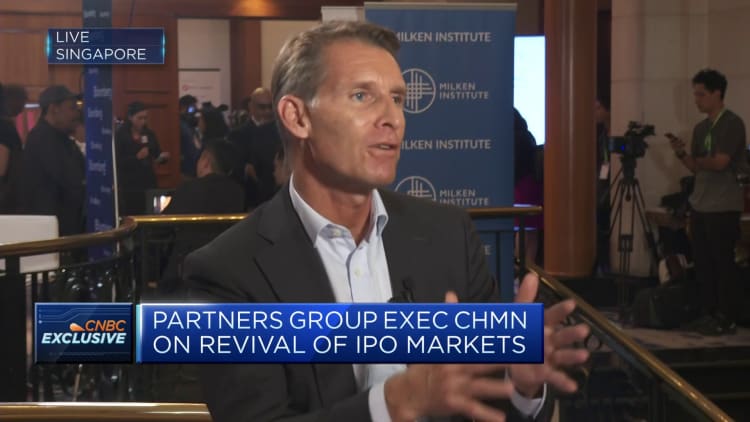
The IPO market has lost relevance in the real economy, but there are “absolutely enormous” opportunities in the health-care sector, according to the executive chairman of global private markets firm Partners Group.
“The IPO market has lost a lot of relevance for the real economy, but specifically for private markets,” Steffen Meister told CNBC’s Chery Kang Wednesday on the sidelines of the Milken Asia Summit in Singapore.
Meister acknowledged some recovery, but pointed out that in the last few years, four out of five businesses in the IPO markets were non-profitable.
According to a February report by consultancy Bain & Company, the IPO market “shut down almost completely” in 2022 amid sharp declines in public equities. Sponsor-to-sponsor deals plunged by 58% as lenders trimmed their financing for big transactions, the report said.
Private markets are switching places with public markets as the stewards of the real economy.
Steffen Meister
Executive chairman, Partners Group
“Contrast that with private markets that has very long-term funding, we’re performing assets in the real economy. So there is a real role change between public and private markets as far as the financing of the real economy is concerned,” he added.
In recent years, public markets have shrunk, and the focus on recent listings has been on companies with “unproven profitability,” Partners Group said in a separate email to CNBC.
In another report released by McKinsey last year, the management consultancy said the private equity sector “[outperformed] public market equivalents” by nearly any measure in the past decade.
“Private markets are switching places with public markets as the stewards of the real economy,” said Partners Group.
Partners’ Group recorded $142 billion worth of assets under management as of the first half of 2023.
Asked whether Partners Group will someday open up the window for retail investors to tap into the private equity market, Meister said it’s already happening, marking a “democratization” of the private market industry.
“I think that is a real change for the industry in the next 10 years, I believe,” said Meister.
‘Absolutely enormous’ opportunities?
Meister also cited big investment opportunities in the health-care sector.
There will be a “complete redistribution” of profit pools away from small molecules, chemical products to large molecules, advanced therapies and biologics, he said.
We are at the beginning of a real transformation of the economy triggered by AI, computation power, data service and all of that.
Steffen Meister
Executive chairman, Partners Group
“You talk about new businesses coming up in contract research, manufacturing, development, commercialization. So there are opportunities that are absolutely enormous,” he added.
Meister also highlighted the advent of artificial intelligence and its role in transforming the economy.
“We are at the beginning of a real transformation of the economy triggered by AI, computation power, data service and all of that,” he said.
People are ‘too focused’ on rate hikes
The U.S. Federal Open Market Committee’s next meeting is scheduled for Sept. 19 to 20.
There’s a 97% chance the central bank will leave rates unchanged after its September meeting, according to the CME’s FedWatch tool.
However, Meister questions the relevance of where the rates will be in the next few years.
“I think people are a little too focused on the rate hike — the next one coming, or not coming?” he said, elaborating that funds will come from private markets directly rather than from the banks.
“Direct lending will actually be more consistent and will be there, this will be a couple of trillion dollars industry,” Meister added.
Credit: Source link












